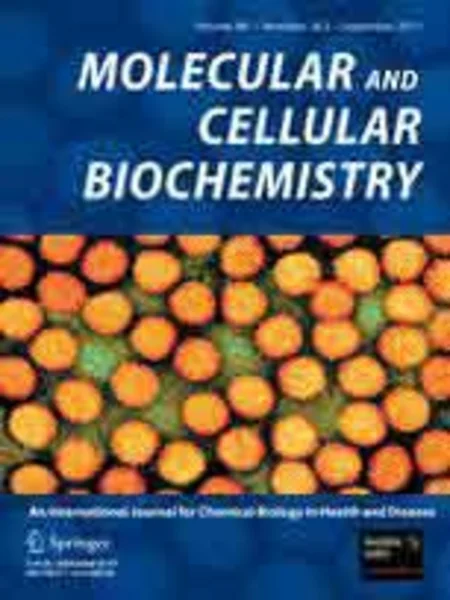-
thrombospondin-1-induced smooth muscle cell chemotaxis and proliferation are dependent on transforming growth factor-β2 and hyaluronic acid synthase
جزئیات بیشتر مقاله- تاریخ ارائه: 1392/07/24
- تاریخ انتشار در تی پی بین: 1392/07/24
- تعداد بازدید: 816
- تعداد پرسش و پاسخ ها: 0
- شماره تماس دبیرخانه رویداد: -
angioplasty causes local vascular injury, leading to the release of thrombospondin-1 (tsp-1), which stimulates vascular smooth muscle cell (vsmc) migration and proliferation, important steps in the development of intimal hyperplasia. transforming growth factor beta 2 (tgf-β2) and hyaluronic acid synthase (has) are two pro-stenotic genes upregulated in vsmcs by tsp-1. we hypothesized that inhibition of tgf-β2 or has would inhibit tsp-1-induced vsmc migration, proliferation, and tsp-1 signaling. our data demonstrate that inhibition of either tgf-β2 or has inhibited tsp-1-induced vsmc migration and proliferation. activation of erk 1 was decreased by tgf-β2 inhibition and unaffected by has inhibition. tgf-β2 and has are not implicated in tsp-1-induced thbs1expression, while they are each implicated in tsp-1-induced expression of their own gene. in summary, tsp-1-induced vsmc migration and proliferation rely on intact tgf-β2 signaling and has function. tsp-1 activation of erk 1 is dependent on tgf-β2. these data further expand our understanding of the complexity of tsp-1 cellular signaling and the involvement of tgf-β2 and has.
مقالات جدیدترین رویدادها
-
استفاده از تحلیل اهمیت-عملکرد در ارائه الگوی مدیریت خلاقیت سازمانی و ارائه راهکار جهت بهبود
-
بررسی تاثیر ارزش وجوه نقد مازاد بر ساختار سرمایه شرکت های پذیرفته شده در بورس اوراق بهادار تهران
-
بررسی تأثیر سطح افشای ریسک بر قرارداد بدهی شرکت های پذیرفته شده در بورس اوراق بهادار تهران
-
بررسی تأثیر رتبه بندی اعتباری مبتنی بر مدل امتیاز بازار نوظهور بر نقد شوندگی سهام با تأکید بر خصوصی سازی شرکت ها
-
تأثیر آمیخته بازاریابی پوشاک ایرانی بر تصویر ذهنی مشتری پوشاک ایرانی (هاکوپیان)
-
بررسی پترولوژیکی و ژئوشیمیایی سنگ های ولکانیکی میوسن شمال خروانق - شرق دستجرد
-
استخراج تایمینگ متغیر بهینه برای موتور چهارسیلندر xu7
-
یک الگوریتم جدید موازی جستجوی اول سطح با استفاده از پردازنده گرافیکی
-
بررسی عملکرد یک موتور اشتعال تراکمی مخلوط همگن با سوخت هیدروژن
-
the impact of online teaching on esl student’s academic grammar proficiency during post-covid
مقالات جدیدترین ژورنال ها
-
مدیریت و بررسی افسردگی دانش آموزان دختر مقطع متوسطه دوم در دروان کرونا در شهرستان دزفول
-
مدیریت و بررسی خرد سیاسی در اندیشه ی فردوسی در ادب ایران
-
واکاوی و مدیریت توصیفی قلمدان(جاکلیدی)ضریح در موزه آستان قدس رضوی
-
بررسی تاثیر خلاقیت، دانش و انگیزه کارکنان بر پیشنهادات نوآورانه کارکنان ( مورد مطالعه: هتل های 3 و 4 ستاره استان کرمان)
-
بررسی تاثیر کیفیت سیستم های اطلاعاتی بر تصمیم گیری موفق در شرکتهای تولیدی استان اصفهان (مورد مطالعه: مدیران شرکتهای تولیدی استان اصفهان)
-
مطالعه تطبیقی نفقه زوجه در آموزه های قرآن کریم و قانون مدنی افغانستان
-
واکاوی تجارب زیسته مدیران آموزشی از چالش ها و موانع توسعه صلاحیت حرفه ای
-
سیره اقتصادی امام علی (علیه السلام) در الگوی تولید و مصرف مدبرانه
-
راهکارهای درمان پرخاشگری از دیدگاه قرآن و روایات
-
the impact of resistance economic policies on the reduction of cases that have been rejected and the tax gap in businesses




سوال خود را در مورد این مقاله مطرح نمایید :